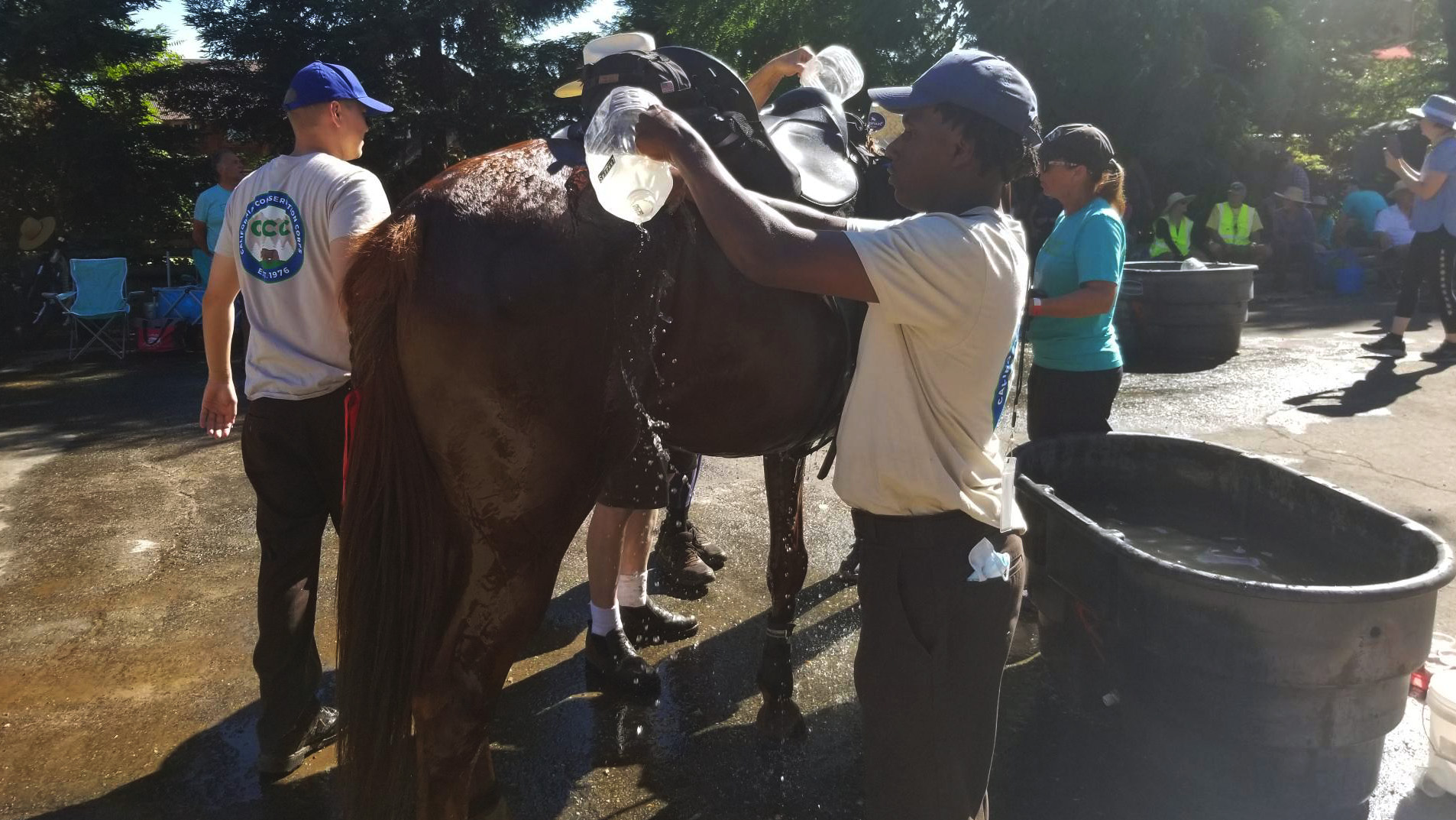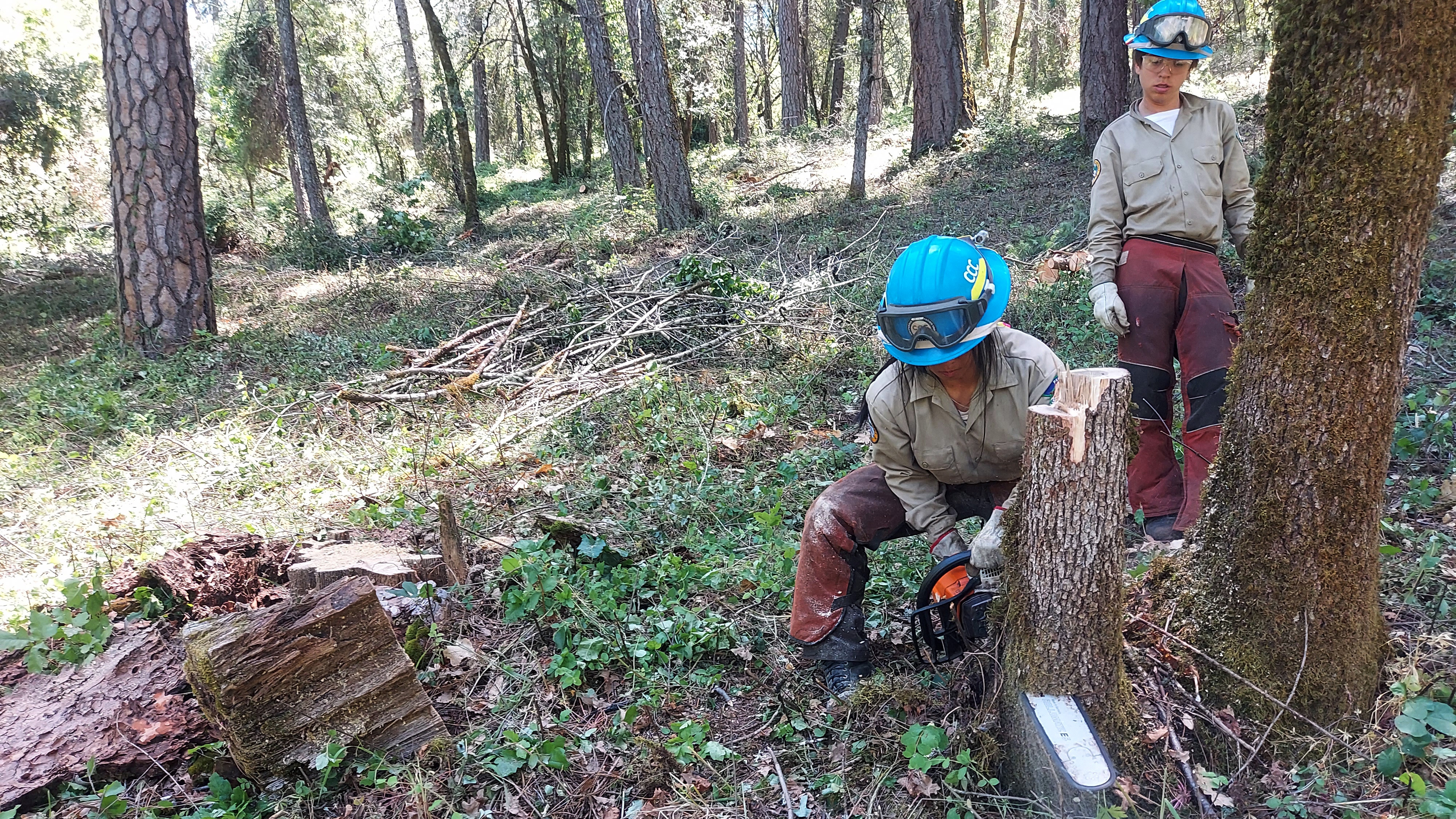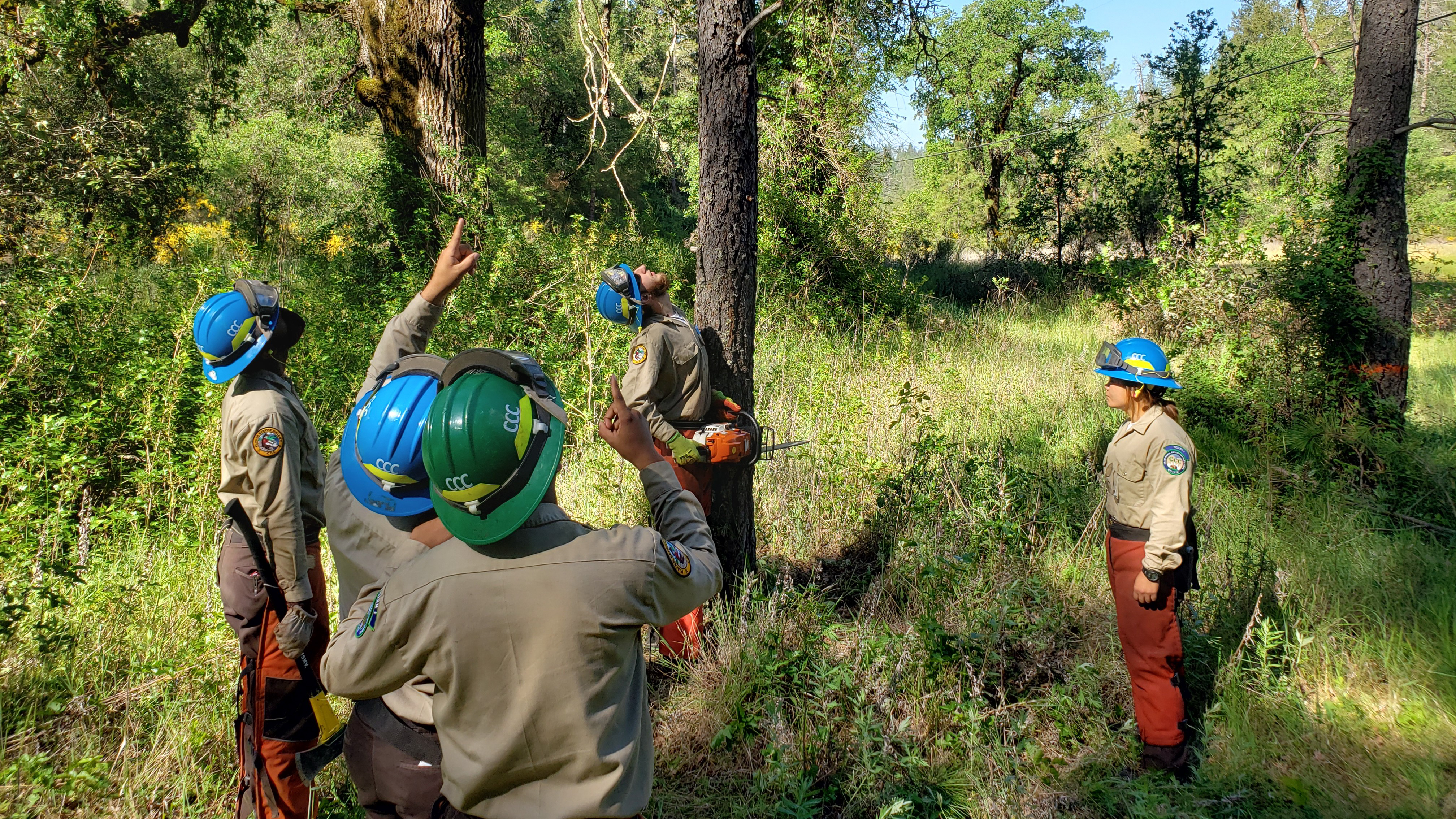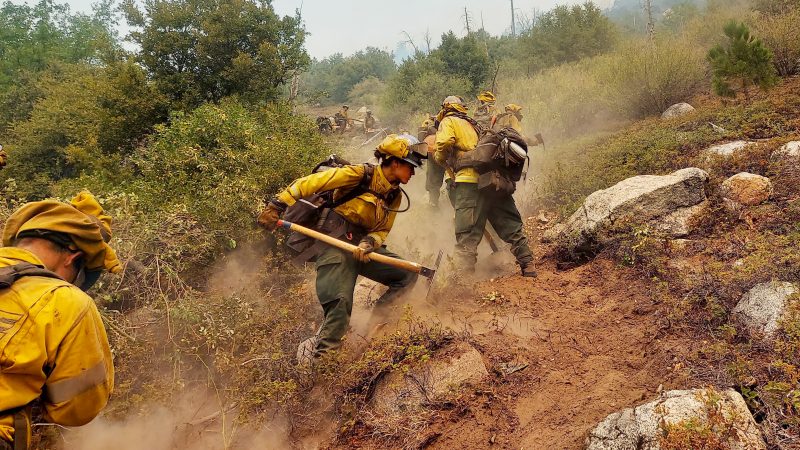Placer Center
The Placer Center is nestled in a rural residential area just north of the City of Auburn in Placer County. The facility was first used by the state in the 1950s and now houses up to 100 Corpsmembers.
In 2022, a new multi-purpose building, kitchen and dormitory opened at the facility for Corpsmember use and housing. The Placer Center sits on 60 acres of land in the Sierra foothills, a short drive from Interstate 80.
The center conducts conservation work in El Dorado, Placer, Nevada, Sierra, Yuba, and Sacramento counties. The center partners with CAL FIRE to operate two year-round wildland firefighting hand crews. Four other natural resource crews focus on fuel reduction, tree planting, trail building, hazard tree removal, and culinary arts.
3710 Christian Valley Road
Auburn, CA 95602
530-240-3180
Placer Center
Placer Center Video Tour
Life at the Placer Center

CCC Placer Corpsmember K’veyon Ball pours water on a horse participating in the annual Tevis Cup, a 100-mile horse ride from Tahoe to Auburn. Corpsmembers volunteered their time helping the riders and horses.
The Placer Center is located in an area traditionally known as “Coyote Springs” by the Maidu and Nisenan tribes of Indigenous Californians. The Maidu tribe call the central Sierra Nevada, in the watersheds of the Feather and American rivers, home. The Nisenan’s territory includes areas in and adjacent to the Placer Center including the Yuba, Bear, and American River watersheds.
Staff helps Corpsmembers find and coordinate participation in volunteer events in the Auburn and Placer County communities. Corpsmembers regularly spend personal time at the Placer Center Nature Center, as well as highway and river cleanups. The center regularly participates in Adopt-a-Highway litter clean-up along Interstate 80. Volunteering is required to earn the CCC Brad Duncan Scholarship.
Opportunities are available for Corpsmembers to further their education and earn additional certifications at local community colleges. Placer Center regularly works with Sierra College and Yuba City College to offer specialized courses to Corpsmembers. Courses include Emergency Medical Technician (EMT) and firefighter academies.
When not at work, Corpsmembers can enjoy the center’s weight room, library, various gaming tables, outdoor and indoor basketball and volleyball courts, horseshoe pits, a music room, and an outdoor fire pit. Off the center’s grounds, hiking trails are readily accessible by foot. Nearby lakes, reservoirs, and rivers offer summer outdoor recreation opportunities. In the winter, skiing, sledding, snowboarding, ice skating, snowshoeing, and snow play is a short drive away.
Placer Corpsmembers can participate in special field trips and volunteer events, such as getting hands-on experience in a historical archaeological excavation at Manzanar National Historic Site, visiting Colonel Allensworth State Historic Park, and touring the Cesar Chavez National Monument. Corpsmembers often volunteer at community and educational events including Martin Luther King Day, Cesar Chavez Day, Black History Month, Women’s History Month, Earth Day, Pride Month, Juneteenth and others.
Placer Center has a variety of other fun events, including midnight breakfast on New Year’s Eve, a Super Bowl viewing party, and outdoor movie night. Corpsmembers may also attend educational and recreational trips to nearby state parks and museums.
Projects

Corpsmember Mayleen Do uses a chain saw to cut a downed tree down to its stump during a Proposition 68 project near Greenwood, CA.
Corpsmembers typically work four days a week, from 6:30 a.m. to 5:00 p.m. Crews may be assigned to “spikes”, where Corpsmembers camp near project work sites for up to eight days straight. Spikes typically occur Wednesday to Wednesday.
Wildland Firefighting: The Placer Center partners with CAL FIRE to operate two year-round wildland firefighting hand crews. Corpsmembers construct fire line with hand tools, lay fire hose, and mop up wildland fires. Corpsmembers work directly on active fire lines and often hike miles into remote areas to combat wildfires. When not actively fighting wildfires Corpsmembers work with CAL FIRE on fuel reduction projects to reduce the fire threat in key locations in Placer, Nevada, and Yuba counties.
Project work in recent years has included trail construction, fuel reduction, stream clearance, tree planting, native flora planting and maintenance, highway vegetation maintenance, tree trimming, storm damage clean up, flood emergency response, wild land fire response, and fire camp support. Sponsors include city and county agencies, Department of Water Resources, CAL FIRE, State Parks, Caltrans, Cal Recycle, U.S. Forest Service, Placer County Resource Conservation District, Bureau of Reclamation, and others.
Emergency response is a major part of the CCC’s mission. The CCC Placer Center regularly responds to local and statewide emergencies, often deploying at a moment’s notice. Recent assignments include COVID-19 food bank support, winter storm recovery, wildland firefighting base camp support, and flood fighting. Corpsmembers may be required to work extended hours on these assignments and may earn additional pay.
Corpsmembers looking to pursue a career in culinary arts can earn their ServSafe food handler and manager certifications by working in the Placer Center’s kitchen. Corpsmembers learn how to operate an institutional kitchen while providing their fellow Corpsmembers with daily meals. Culinary Corpsmembers learn food preparation, tool usage, sanitation and safety, food storage and other skills. Watch how Placer Corpsmembers prepare meals each day for more than 80 Corpsmembers on the CCC YouTube page at this link.
Education and Training

Placer Corpsmembers size up a tree during a chain saw tree felling training class in 2021.
All Corpsmembers at the Placer Center are required to complete Corpsmember Orientation, Motivation, Education, and Training (COMET) and Core Training courses. The Conservation Awareness core course is instructed by subject matter experts from the Placer Nature Center. The Career Development and Transition core course is instructed by subject matter experts from the Placer School for Adults and the Placer Center’s Career Transition Navigator.
Placer Center also partners with Yuba City College and Sierra College to provide opportunities for Corpsmembers to attend a CAL FIRE Firefighter I qualifying academy.
Corpsmembers have many options for hands-on training, based on their interests, including:
- CAL FIRE Firefighter Training
- Chain Saw Training and Certification
- Chipper Safety & Training
- First Aid, CPR, & AED Certification
- Flora and Fauna Identification
- Herbicide Application and Safety
- Flood Fighting
- California Naturalist Certification
- ServSafe Food Handler and Manager Certifications
- Hazardous Waste Operations and Emergency Response (HAZWOPER) 40-Hour Training
- Maintenance Employee Safety Orientation Certification
- Pesticide Handler Safety
- Power Tools Safety and Operation
- Trail Construction and Maintenance
- Arborist Tree Climbing Training
Placer Center encourages and supports all Corpsmembers earning their personal Driver License and will financially assist with behind the wheel driving school costs. Once holding a driver license, Corpsmembers may attend additional CCC training and become operators of State of California vehicles, including in some cases licenses to operate specialty vehicles (large capacity vans, forklifts, etc.).
Many Corpsmembers enroll in Emergency Medical Technician courses through Sierra College. Others attend courses to become certified shorefront lifeguards.
Through a partnership with John Muir Charter School, CCC Placer Center offers classes to Corpsmembers in need of their high school diploma. Many Corpsmembers consider earning their high school diploma to be one of most important achievements obtained while in the CCC.
Placer Corpsmembers go on to careers with California Department of Fish and Wildlife, CAL FIRE, California State Parks, federal land management and wildfire agencies, private wildland firefighting companies, local fire departments and academies, and private arborist companies. Corpsmembers also pursue college opportunities using the scholarships earned in the CCC.


